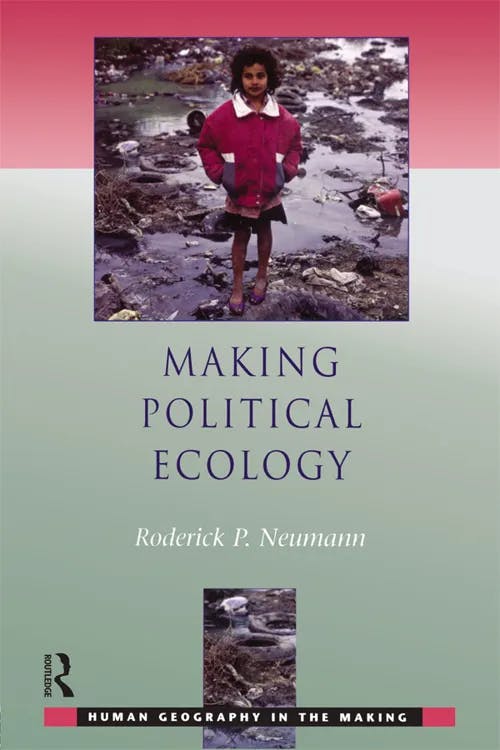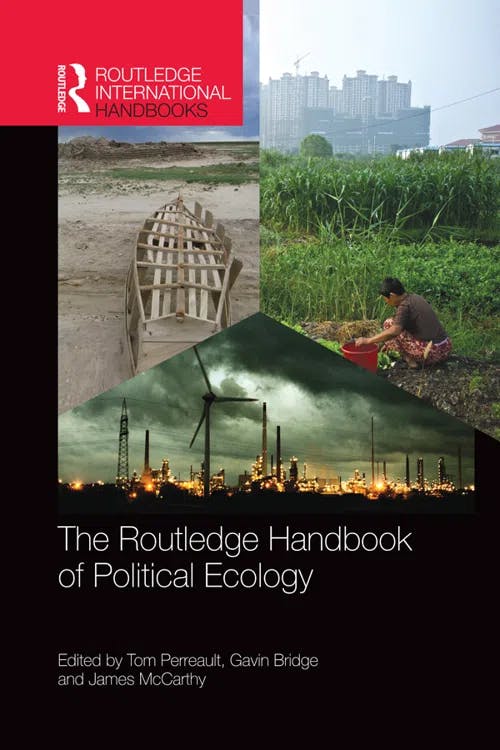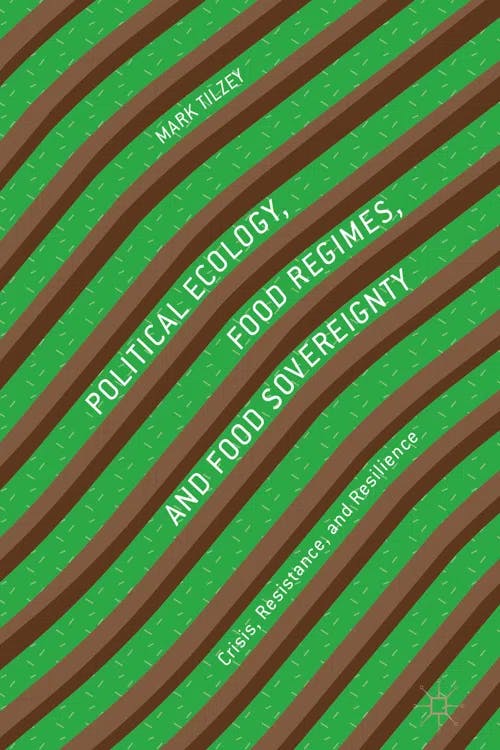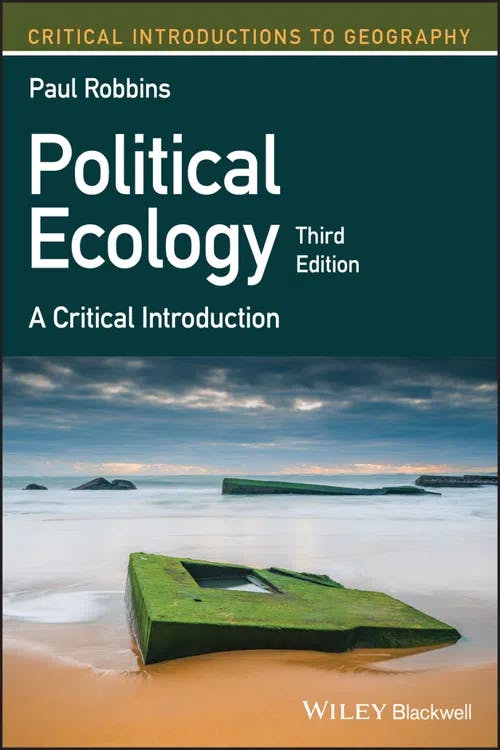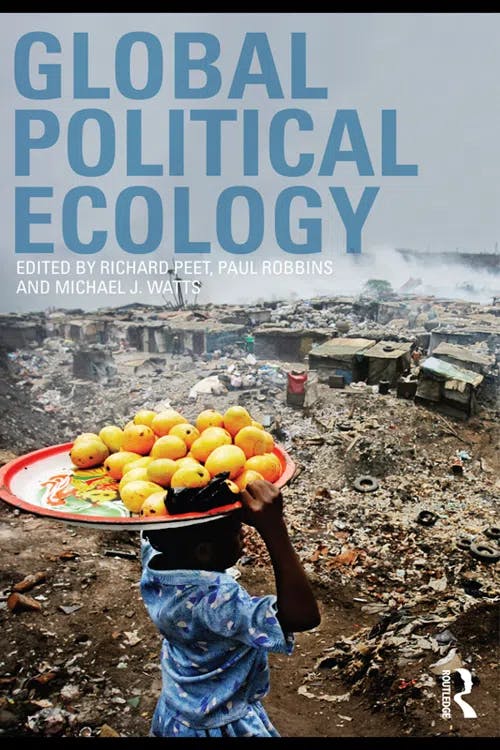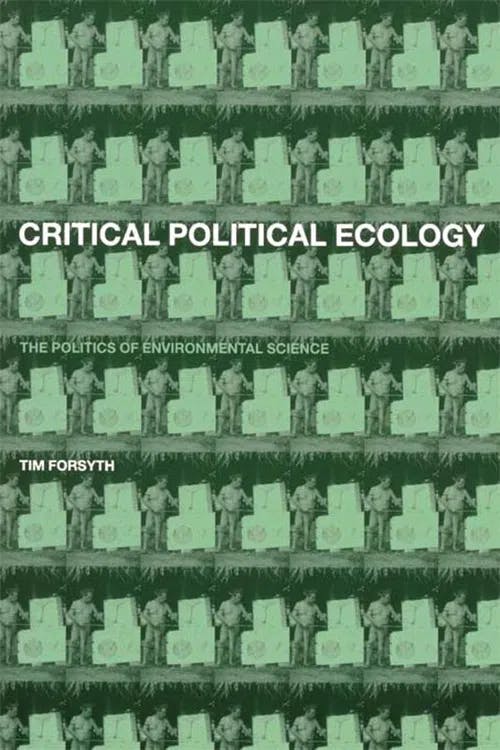What is Political Ecology?
MA, Sociology (Freie Universität Berlin)
Date Published: 09.11.2023,
Last Updated: 21.02.2024
Share this article
Defining political ecology
Political ecology is a multidisciplinary approach to understanding environmental issues as fundamentally interrelated with political, economic, and social factors. It emerged in the 1970s and 1980s at the convergence of the fields of geology, anthropology, and history. Political ecology seeks to better analyze how climate change is socially produced, and how its impacts are unequally distributed. As opposed to conventional approaches to environmental science that did not take these points into account, scholars of political ecology
[…] claimed that the ultimate causes of environmental degradation could be explained using the principles and concepts of political economy, including questions about wealth distribution, patterns of accumulation, the role of the state and power to control access to land and resources. Their central premise was that ecological problems are at their core social and political problems […] (Neumann, 2014)
Roderick P. Neumann
[…] claimed that the ultimate causes of environmental degradation could be explained using the principles and concepts of political economy, including questions about wealth distribution, patterns of accumulation, the role of the state and power to control access to land and resources. Their central premise was that ecological problems are at their core social and political problems […] (Neumann, 2014)
Since its emergence, political ecology has become an increasingly mainstream lens through which we can understand how issues related to the natural environment intersect with other forms of social inequality.
Political ecologists take into account a holistic array of factors including power, wealth distribution, and access to natural resources when it comes to developing policy initiatives for environmental sustainability and conservation. This study guide delves further into these key points of analysis, which differentiate this discipline from other, more conventional ways of understanding the natural environment as independent from matters of social justice. We then provide an overview of perspectives, theoretical influences, and critiques that continue to shape discourses of political ecology.
Key points of analysis in political ecology
Power and inequality
Political ecology recognizes that power and inequality are fundamental aspects not only of how the environment is shaped by human interests but also in terms of how different groups of people experience environmental change. Political ecologists view systems of oppression — such as colonialism, white supremacy, patriarchy, and capitalism — as deeply intertwined with questions of environmental change. As described in The Routledge Handbook of Political Ecology, political ecologists,
[…] see these effects in deforestation, soil erosion and the destruction of biodiversity in the Third World, in accumulation by dispossession and the deterritorialization of peoples, in the production of poverty and social inequality. (Enrique Leff, “The Power-full Distribution of Knowledge in Political Ecology,” 2015)
Edited by Tom Perreault, Gavin Bridge, and James McCarthy
[…] see these effects in deforestation, soil erosion and the destruction of biodiversity in the Third World, in accumulation by dispossession and the deterritorialization of peoples, in the production of poverty and social inequality. (Enrique Leff, “The Power-full Distribution of Knowledge in Political Ecology,” 2015)
Specifically, political ecologists evaluate which governments and economic firms get to make decisions around how natural resources are used and which people or groups face the consequences of these decisions.
These questions take on an international character under globalization as multinational corporations, state-sponsored proxy wars, and land grabbing play an increasingly central role in producing environmental degradation. In turn, political ecologists highlight that poor and indigenous people often bear the brunt of any ensuing environmental degradation that might occur in the wake of these top-down, extractive decisions. For instance, these power dynamics are evident in Brazilian president Jaír Bolsonaro’s decision to dispossess indigenous people of their lands in the Amazon as part of a policy directive to have ranchers cut down the rainforest to raise cattle to supply multinationals like McDonald’s (see Brazil after Bolsonaro for more).
Natural resource use and distribution
By extension, questions of power and inequality also shape how natural resources are used and distributed. Here, political ecology highlights the contrast between utilizing land and resources in line with market imperatives versus using them in accordance with the needs and livelihoods of local populations. Political ecologists do so by identifying patterns in how natural resources are extracted, utilized, and circulated both within local populations and around the world. In turn, they advocate for more egalitarian redistribution of resources for use among regular people rather than extractivism by external actors driven by a profit motive. As Mark Tilzey argues, this redistribution would involve
[…] social relational transformation, re-asserting the political authority of community (commons) as solidarity, or moral, economy, and subverting the institutional separation of the ‘economy’ and ‘polity’ of the modern state, finally removes the market (capitalism) as essential mediator between people and their means of livelihood. (2017)
Mark Tilzey
[…] social relational transformation, re-asserting the political authority of community (commons) as solidarity, or moral, economy, and subverting the institutional separation of the ‘economy’ and ‘polity’ of the modern state, finally removes the market (capitalism) as essential mediator between people and their means of livelihood. (2017)
In other words, redistributing natural resources goes hand in hand with a more broadly transformative political agenda where society is not organized around turning profits at all costs, but around ensuring common people have what they need to live good lives. Political ecologists suggest that this shift would also result in more environmentally sustainable practices. This is because local communities are more invested in maintaining ecological balance when utilizing natural resources than multinationals who are not directly impacted by the environmental harms of extractivism.
One example of how unequal natural resource distribution intertwines with environmental degradation can be found in the case of palm oil cultivation in Malaysian Borneo (see The Palm Oil Multinationals from Malaysia). In this context, governments have initiated development schemes that often displace indigenous peoples from their lands in order to cultivate and export cash crops like palm oil. Not only is palm oil production notoriously harmful to the environment, but it has meant that indigenous people must conduct the rest of their livelihood activities such as rice cultivation, rubber tapping, and fishing on a much smaller portion of viable land. As a result, many are not able to survive under their traditional livelihoods, which are also more attuned to the local ecology. By advocating for indigenous peoples to have more of a say in how natural resources — such as land itself — are allocated and used, political ecologists argue that these practices would also become more sustainable.
Environmental justice
By recognizing that the poor often bear the brunt of environmental degradation and advocating for a more equitable distribution of natural resources, political ecologists center the importance of environmental justice in development of more sustainable environmental programs. In other words, political ecologists believe that environmental concerns are inherently connected with social concerns. As Paul Robbins elaborates, environmental justice
[…] is predicated on the well‐established fact that disempowered communities, especially racial minority communities and the urban poor, are disproportionately located in and around technological hazards, like lead smelters, garbage incinerators, power plants, and other potentially deadly sources of exposure. (2019)
Paul Robbins
[…] is predicated on the well‐established fact that disempowered communities, especially racial minority communities and the urban poor, are disproportionately located in and around technological hazards, like lead smelters, garbage incinerators, power plants, and other potentially deadly sources of exposure. (2019)
Not only does human activity shape the natural environment but, especially as climate change continues, environmental degradation deeply impacts human societies, with disproportionate effects on poor, indigenous, and other vulnerable groups. To restore environmentally just conditions, political ecologists advocate for legislation demanding more accountability around land use from political and economic actors; rethinking how we conceptualize land ‘ownership’ and our relation to the land; and the restoration of common lands for all to use.
Environmental justice also acknowledges that many conflicts are situated around access to natural resources such as land, water, and oil. Such is exemplified in the Cochabamba Water Wars when the Bolivian government attempted to usher in the privatization of water by outlawing the collection of rainwater for drinking (see Water Governance in Bolivia). This was met with fierce resistance in the form of large scale civil unrest by the local, predominantly indigenous population until the government was forced to retract its decision. In addition, many argue that the United States’ ongoing wars in the Middle East over the last decades have also been motivated by a desire to control oil found there. Thus, environmental justice predicated on the egalitarian distribution and stewardship of natural resources by local populations is central to mitigating civil unrest, war, and other geopolitical conflicts.
Perspectives on political ecology
Neo-Marxist
Marxian political economy is one of the key currents of thought influencing the discipline of political ecology today. This is because political economy looks at how the state and the economy are intertwined, and our current state and economy are focused on achieving market growth and expansion. As laid out in Global Political Ecology,
Marx conceptualized capitalist development as socially unjust (the benefits were unevenly distributed), geographically and temporally uneven (occurring more at some places and some times than others), expansionary (invading and controlling societies all over the world) and full of crises (recessions and depressions) periodically necessary for restoring the conditions of profitability destroyed by fierce competition [...]. (Peet, Robbins, and Watts, 2010)
Edited by Richard Peet, Paul Robbins, and Michael J. Watts
Marx conceptualized capitalist development as socially unjust (the benefits were unevenly distributed), geographically and temporally uneven (occurring more at some places and some times than others), expansionary (invading and controlling societies all over the world) and full of crises (recessions and depressions) periodically necessary for restoring the conditions of profitability destroyed by fierce competition [...]. (Peet, Robbins, and Watts, 2010)
Political ecologists, therefore, contend that capitalism is a fundamental driver of social inequality as well as environmental injustice and degradation. Some advocate for rethinking our current economic system altogether in order to ensure a more sustainable future.
Another pillar of Marxist thought that influences political ecology is his concept of historical materialism, the idea that societal developments are produced by struggles between classes. In particular, political ecologists are concerned with relations of power and struggle between different actors — governments and multinationals on one hand, and peasants, indigenous peoples, and workers on the other. In turn, land use and tenure is shaped by these underlying struggles. As Richard Peet, Paul Robbins, and Michael Watts explain,
In particular, these struggles involve removing peasants from ownership of land, or rights to their own means of production, ejecting them into the labor market as owners merely of their own persons (“individual liberty”), and forcing them, by threat of starvation, to sell their value-creating capacity to capital for a wage. (2010)
Thus, political ecologists analyze conflicts and struggles in terms of how they produce both socio-economic exploitation and environmental consequences. (For more on how capitalism intersects with questions of land ownership and indigenous sovereignty, check out our study guide on primitive accumulation.)
Poststructuralist
Poststructuralism offers another key theoretical perspective within the discipline of political ecology. Poststructuralism, in brief, is a school of thought that challenges fixed conceptions of identities, structures, and meanings. Political ecologists have taken inspiration from this field to question conventional understandings of our relationship to the natural environment. As Neumann explains, political ecologists are influenced,
[…] by strong postmodernist positions, while at the same time sharing post-structuralist concerns of the importance of discourse, representation, and imagery in structuring knowledge of the world […]. (2014)
For instance, political ecologists critique rigid delineations of society and the environment, instead highlighting the deep interplay between the two. They argue that not only do humans influence environmental conditions, but also environmental conditions — such as the climate and other species — have a profound impact on culture, society, and history.
Poststructuralist thought also influences how political ecologists conceive of land ownership. Western notions of property ownership are often based on deeds or documents; the land is understood to be passive, and its owners are more or less able to do what they like with it. Political ecologists point out that many indigenous cultures see the land as alive and impossible to own. Instead, they relate to the land as its stewards and caretakers. Many cultures with these conceptions have traditionally protected the commons, land that is owned by no one, but used — and tended to — by everyone. Poststructuralism interrogates western binary relationships between things like civilization and nature, land and landowner, and so on. Thus, inspired by poststructuralist critique and certain cultural beliefs, the way we conceptualize the so-called natural world can have a major impact on how we treat it.
(For more on the connections between poststructuralism and biology, check out our study guide on biopolitics.)
Postcolonialist
Postcolonialism and political ecology also inform each other in key ways. While postcolonialism tends to focus on human impacts of colonial exploitation, many of these effects also intersect with the environment. The relentless extraction of natural resources is a central pillar of colonial domination, which in turn, leads to deforestation, contamination of water, and damage to the structural integrity of the land itself, such as in the case of sinkholes created by excessive mining. According to Enrique Leff, these dynamics and their effects continue into the present day because,
[…] the imposition of economic rationality and the will to colonial domination have deterritorialized cultures as an effect of the modes of appropriation of nature according to the expansive requirements of capitalism and the geopolitics of sustainable development […]. As a result, through unequal exchange, there is a transfer of resources from the poor countries of the South, rich in natural resources, to countries of the North, degrading the ecological potential of the territories of the South at an unprecedented scale. (2015)
Thus, postcolonial theory is useful in drawing continuities between the harmful patterns of extraction that have shaped the flow of resources throughout history and the extractivism that shapes the contemporary geopolitical order. These dynamics, in turn, leave inhabitants of the global South to deal with the negative environmental consequences while multinationals and nation states in the global North enjoy the spoils of these exploits. Thus, political ecology advocates for many of the same causes as movements dedicated to the liberation of colonized peoples — including land sovereignty, indigenous rights, and self-determination.
(For more on the global-historical continuities shape our current geopolitical circumstances, check out our study guide on world-systems theory.)
Criticisms of political ecology
Political ecology does garner some criticisms, which can be split into two main camps: critique of the methods used to support the discipline and critique of the demands put forth by it.
Methodology critique
In terms of methodological contentions, one critique is that political ecologists are too entrenched in contemporary normative values — in particular, values centering on social justice and inequality. Critics argue that being overly invested in these norms can produce biases in research. For example, if political ecologists are intent on honoring indigenous land sovereignty at the outset of conducting a study, they might wind up overriding empirical evidence that a given tract of land should be kept uninhabited in order to best conserve or revitalize it.
This issue is compounded when an entire discipline is organized around a dedication to these normative values — resulting in an echo chamber effect. As Timothy Forsyth points out in Critical Political Ecology,
First, the establishment of a “common” or “world” view through political activism or epistemic communities of course begs the question as to whether such a view accurately or fairly represents all people such views are claimed to stand for. (2004)
Timothy Forsyth
First, the establishment of a “common” or “world” view through political activism or epistemic communities of course begs the question as to whether such a view accurately or fairly represents all people such views are claimed to stand for. (2004)
Its critics argue that this type of blanket emphasis on a certain set of values within political ecology can, therefore, permeate entire research programs and their outcomes — without necessarily being based on empirical evidence.
Demands critique
In turn, political ecology is also criticized for presenting a vision for an alternative world that is unrealistic and too incompatible with our current political and economic structures to make a tangible impact. As Peet, Robbins, and Watts argue,
At base, political ecology says that we need a set of interventions and frameworks capable of laying the groundwork upon which we in the North, and the South too in different ways, must change our whole way of life. […] [T]inkering around the edges of capitalism will not do, will not make sufficient difference. And social transformation must happen, moreover, within a time frame – our lifetimes – that is intimidating in its urgency. (2010)
In other words, political ecology advocates for the radical restructuring of society, including the overhauling of our economic system and toppling the current geopolitical order. This broad transformative vision is captured in the slogan advocating for “system change not climate change.” However, due to path dependence — the inertia of all processes, institutions, and power structures, and influence of current global economy and hegemony — it is difficult to actually implement the vision political ecologists put forth.
Closing thoughts
Political ecology provides an interdisciplinary approach to understanding the fundamental interconnections between human societies and the natural environment. It contends that many environmental problems are also produced by the same drivers of other forms of oppression and inequality. Specifically, political ecologists point to systems of capitalism, neocolonialism, and global hegemony as the main drivers of environmental degradation. Therefore, they advocate for the radical redistribution of natural resources, empowerment of local and indigenous communities, and the liberation of colonized peoples as fundamental to bringing about environmental justice — both for people and the planet.
The discipline draws upon a number of key theoretical currents including neo-Marxism, poststructuralism, and postcolonial studies. Its critics suggest that this value-laden approach to environmental conservation can pose an impediment towards arriving at empirical truths, and that its advocacy for total system change makes it unpragmatic. Still, political ecology integrates a theory of power into its analysis of the changing environment, and dares to challenge systems of oppression in ways that are lacking in conventional discourse around conservation and sustainability. Today, it is widely accepted as an important contributor to our understanding of human-environment interaction.
Further reading on Perlego
Vibrant Matter (2010) by Jane Bennett
Urban Political Ecology in the Anthropo-obscene (2018) edited by Henrik Ernstson and Erik Swyngedouw
The Political Ecology of the State (2014) by Antonio Augusto Rossotto Ioris
Feminist Political Ecology (2013) edited by Dianne Rocheleau, Barbara Thomas-Slayter, and Esther Wangari
The Political Ecology of Climate Change Adaptation (2014) by Marcus Taylor
Political ecology FAQs
What is political ecology in simple terms?
What is political ecology in simple terms?
What is an example of political ecology?
What is an example of political ecology?
Who are scholars associated with political ecology?
Who are scholars associated with political ecology?
Bibliography
Anuar Md Nor, D. (2015) The Palm Oil Multinationals from Malaysia. LAP LAMBERT Academic Publishing. Available at: https://www.perlego.com/book/3409344/the-palm-oil-multinationals-from-malaysia-how-they-control-a-global-industry-that-started-from-four-humble-seeds-pdf
Bourne, R. (2023) Brazil after Bolsonaro. Routledge. Available at: https://www.perlego.com/book/4196883/brazil-after-bolsonaro-the-comeback-of-lula-da-silva-pdf
Forsyth, T. (2004) Critical Political Ecology. Routledge. Available at: https://www.perlego.com/book/1624110/critical-political-ecology-the-politics-of-environmental-science-pdf
Leff, E. (2015) “The Power-full Distribution of Knowledge in Political Ecology,” in Perreault, T., Bridge, G., & McCarthy, J. (eds.) The Routledge Handbook of Political Ecology. Routledge. Available at: https://www.perlego.com/book/1559567/the-routledge-handbook-of-political-ecology-pdf
Neumann, R. (2014) Making Political Ecology. Routledge. Available at: https://www.perlego.com/book/1616050/making-political-ecology-pdf
Peet, R., Robbins, P., & Watts, P. (eds.) (2010) Global Political Ecology. Routledge. Available at: https://www.perlego.com/book/1609648/global-political-ecology-pdf
Perreault, T., Bridge, G., & McCarthy, J. (eds.) (2015) The Routledge Handbook of Political Ecology. Routledge. Available at: https://www.perlego.com/book/1559567/the-routledge-handbook-of-political-ecology-pdf
Razavi, N. S. (2022) Water Governance in Bolivia. Routledge. Available at: https://www.perlego.com/book/3288908/water-governance-in-bolivia-cochabamba-since-the-water-war-pdf
Robbins, P. (2019) Political Ecology. Wiley-Blackwell. Available at: https://www.perlego.com/book/1148960/political-ecology-a-critical-introduction-pdf
Tilzey, M. (2017) Political Ecology, Food Regimes, and Food Sovereignty. Palgrave Macmillan. Available at: https://www.perlego.com/book/3490808/political-ecology-food-regimes-and-food-sovereignty-crisis-resistance-and-resilience-pdf
MA, Sociology (Freie Universität Berlin)
Lily Cichanowicz has a master's degree in Sociology from Freie Universität Berlin and a dual bachelor's degree from Cornell University in Sociology and International Development. Her research interests include political economy, labor, and social movements. Her master's thesis focused on the labor shortages in the food service industry following the Covid-19 pandemic.

